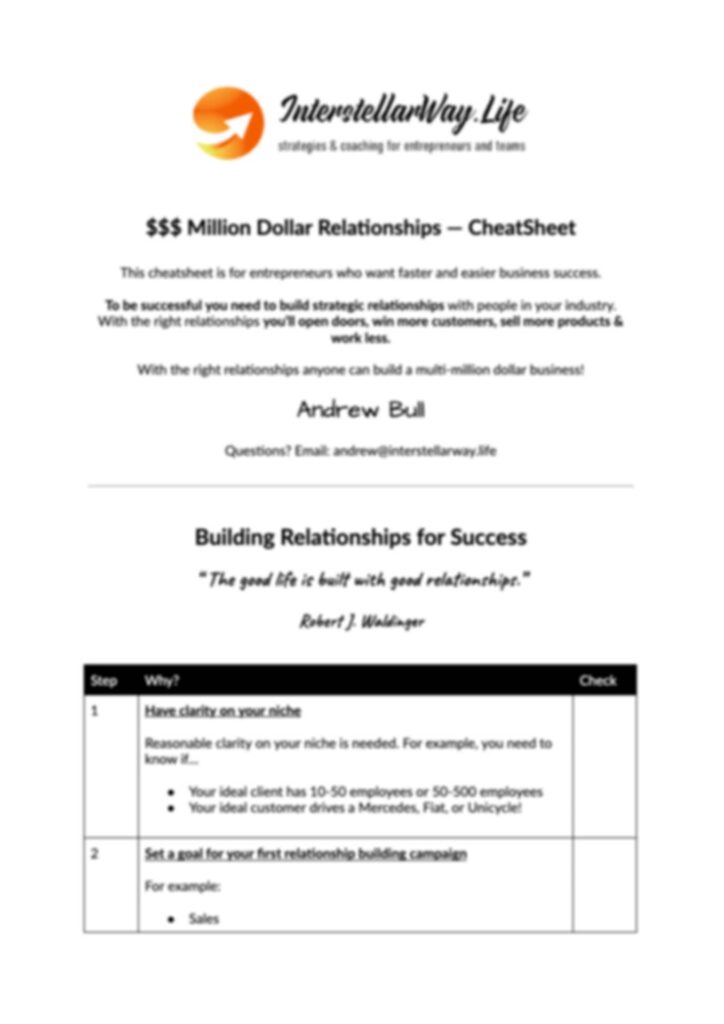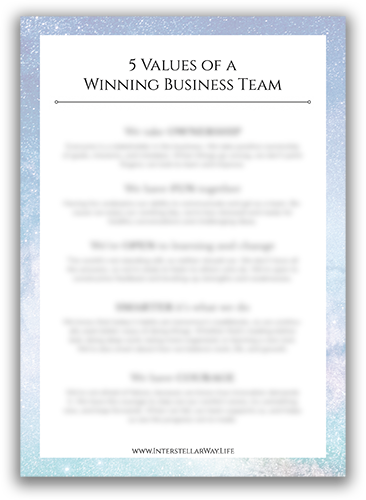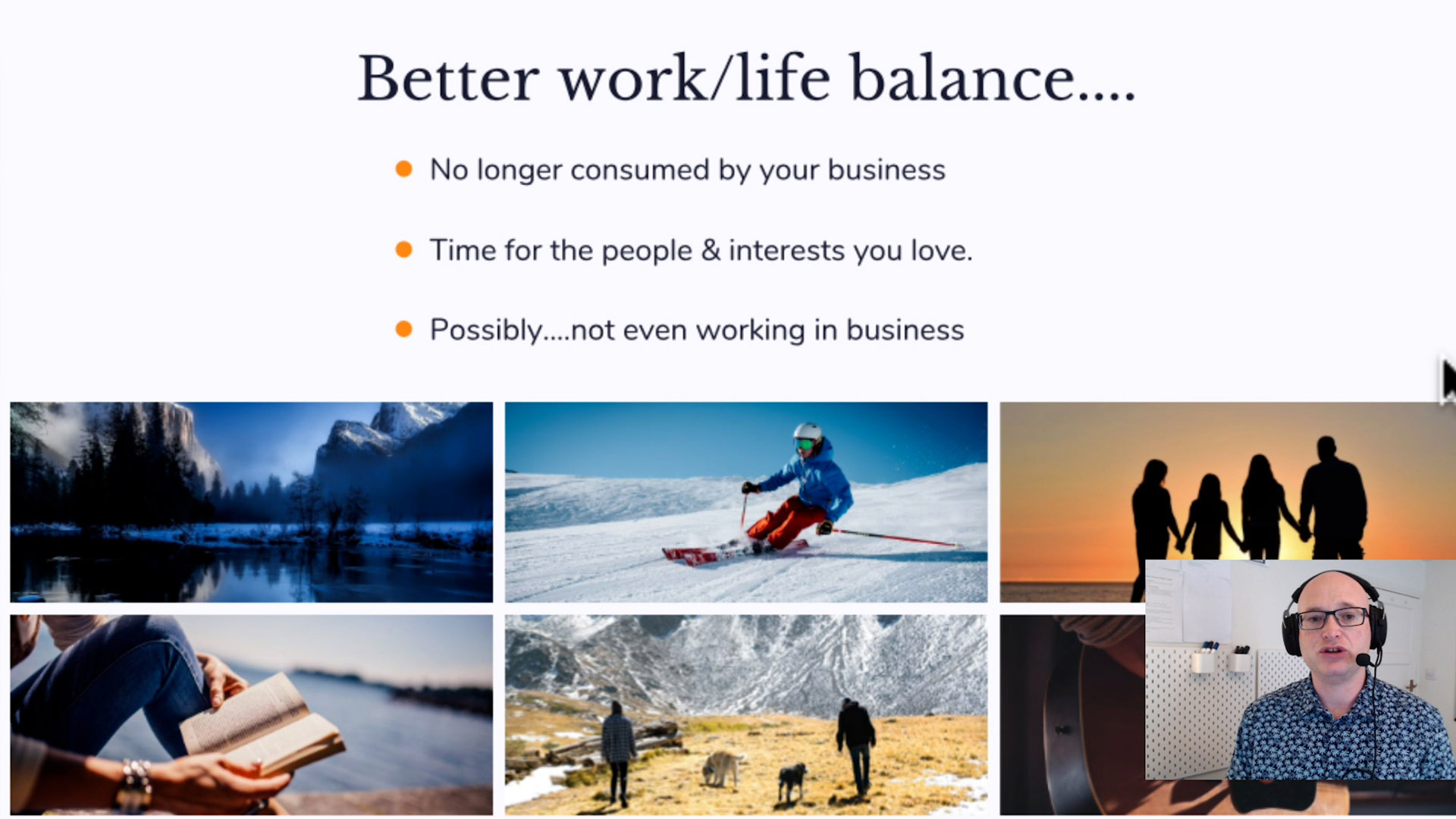Interstellar Business Show
Podcast for Technology CEOs and their teams.
It's time to grow your mind, elevate performance, and own your future 🚀

Interstellar Business Show
Episode: 0032
Lysette Offley on breaking through mental performance barriers
Featuring....
Episode Introduction
“All things are ready, if our mind be so.”
― William Shakespeare, Henry V
I’m convinced that’s true. Because when our minds aren’t ready. They become blocks. They become roadblocks that stop us achieving our goals and unlocking our full potential.
And these kinds of mental roadblocks don’t just affect leaders. They affect our teams too.
So they matter, they’re worth considering. They’re worth thinking about. And they’re definitely worth trying to overcome. Because if you can reduce the mental barriers in your own mind and in the minds of your team,
Think of what your team could achieve and how much more potential you could unlock in your business.
In today’s show: our guest is going to help you and your team overcome some of those mental barriers and help you achieve top performance.
Episode notes & resources
Find out more about Lysette Offley
Pass every exam first time, with a score of 80%, by doing less work: https://Genius-Material.com
Break the glass ceiling to the next level through stellar mindset skills: https://GeniusPrinciples.com/
Connect with me on LinkedIn: https://www.linkedin.com/in/Lysette/
Love this podcast episode? Please leave a review here
Listen to more episodes here: Interstellar.Show
Get Andrew’s free Resources for Tech companies with teams → https://bit.ly/2Ygyoij
Join Andrew’s Interstellar Community → https://interstellarway.life/sign-up-for-newsletter/
Transcript
Please note, this transcription is autogenerated, so there may be errors.
[00:00:00] Shakespeare said. A mind that is ready. Is ready for anything. And I think that’s so true. Because when our minds aren’t ready. They become blocks. They become roadblocks that stop us, achieving our goals and objectives and unlocking our full potential.
And these kinds of mental roadblocks don’t just affect leaders. They affect our teams too. So they matter, they’re worth considering. They’re worth thinking about. And they’re definitely worth trying to overcome. Because if you can reduce the mental barriers in your own mind and in the minds of your team,
Think of what your team could achieve and how much more potential you could unlock in your business.
Here’s the good news in today’s show. Our guest is going to help you and your team. Overcome some of those mental barriers and [00:01:00] help you break through them and achieve top performance.
Now, before we get started with today’s show. And meet our guest. Please make sure you subscribe and follow us wherever you’re listening today. So you never miss an episode again. Now, before we get started with today’s show, please. Now, before we get started with today’s show, please check out my new book called monsters of team performance, which is available@interstellarway.life.
And if you haven’t already done so hit that subscribe button wherever you’re listening today. So you never miss an episode again.
Today. I’m pleased to be joined by Lysette Offley welcome to the show, Lysette.
Yeah, thank you very much for having me, Andrew
So what’s your brand, your business name? Can you tell us that please?
Sure. I’m known as the genius maker because I help people use their brains to get better results, to get the results they need.
So a bit like Rainmaker, [00:02:00] but you’re like raining down geniuses all around us.
We’re all geniuses.
Yeah, no, I, well, I, you know, I’m a big believer in that people are often underestimated in their abilities either by themselves or by other people as well. I mean, like, you know, Thomas Edison and Einstein were both considered slow and not too smart.
So it just shows you how often people are underestimated in the world. Don’t you think? Have you got any other famous examples of people who’ve been
it’s interesting. You should pick on Thomas Edison because he may not have been the first to invent the light. But he was certainly the one who kept going and kept going and then marketed it and became associated with the invention of the light bulb and actually sticking with an idea and keeping going is part of using your brain effectively.
That’s not to say that you pursue something, that’s not going to get you anywhere and that you stupidly don’t pay attention to the evidence around you, but at the same time, being a genius also [00:03:00] means knowing when it’s time. Not just to quit, but when it’s time to keep going and keep going, as I think he would say something along the lines of, you know, I haven’t failed a thousand times.
I’ve just found out a thousand ways that the light bulb won’t work. It’s like cold calling. You know, it’s a numbers game. You can practice your craft, but in the end you have to pick the phone up a certain number of times and you don’t know what that number is until you just keep doing it and keep doing it and keep doing it and get the food.
Yeah. Persistence is key. Not there’s very few things that just happen just like that. They takes iterations and work and tests and try and things. You’re absolutely right.
So let’s move forward into the next part of the show, which is called
So in this part of the show, our guest today, who is Liza will share a big idea that will help you elevate your team or your business, or maybe even just your life.
So what’s your big idea?[00:04:00]
My big idea is about. Self understanding and self management. And from that comes better understanding of other people and better relationships and cooperation with other people. The thing is we seem to have a lot of technical training, available leadership training available, and while it may be absolutely superb, you very often find that the people aren’t necessarily.
Using that training, they’re not utilizing it. There’s something missing something lacking. And I very firmly believe that that’s to do with self-understanding self-awareness self-management. So instead of being thought, instead of being thwarted by. That little voice in your head for want of a better expression instead of having thoughts, [00:05:00] which have you hesitate, procrastinate, feel uncertain, um, not want to start something until you’re absolutely sure you’re going to be able to succeed rather than learning on the job.
Being a perfectionist or work. Feeling like an imposter. That’s only a matter of time before somebody finds you out. All of those things that so many of us are dealing with, or rather, probably not dealing with allowing ourselves to be stopped by all those things will just fall away. If everybody had more awareness, self-awareness more mindset competence.
And for me, it’s something that we all need. Um, wouldn’t it be just great if we learnt it at a much younger age, as you were growing up, who we are, how the world is, how we fit into the world, who the other people are around us, how we can all help each other and work together and understand each other and communicate, of [00:06:00] course, most of us grow up just trying to survive life.
It can be very hard and without the emotional competence. Th that we’re all capable of having, without that it’s so much harder and we get ourselves into such deep water all over for the lack of that, understanding the knowledge, the skills, the insights, like I say, that we’re all perfectly capable of just many of us don’t come across.
And so it seems that the world is like this it’s just perception.
Do you think that, people often confuse feelings and emotions? So for example, someone says are I’m feeling angry because how someone else has driven down the street. Right. And that they, they put their responsibility for their feelings. Onto other people. Do you think this is a common problem that people have.
Yeah, I do, because it looks like that just tit, [00:07:00] somebody does something. And we get upset. And so you can easily point at the source of upset or so you think, but it is an illusion because that very same behavior wouldn’t necessarily upset. The next person. It’s an illusion. We live in a very long thin house that the sun comes up at one end of the house and it goes down at the other end of the house that happens every time.
Even when it’s cloudy, you can see it’s brighter in the morning at that end. And the sunset still happens at that end, but we know that’s an illusion. Everybody will agree with me, the sunrises, their sets there, I get agreement, but it’s an illusion. We know the sun doesn’t move, but it looks like it does.
And it’s the same with what we’re talking about. It looks for all the world to most of us most of the time, but when somebody else does something, that’s the reason we’re up to. And let’s be honest. There’s not a lot [00:08:00] we can do about the other person. So our, our feelings are we saying that our feelings are going to be dictated to our quality of life is going to be dictated to, by something that somebody else does.
There’s no power there.
So we need to really start taking responsibility for our own feelings then don’t we.
Yes, but it doesn’t mean. That somebody driving too fast or by too fast, collectively would probably say negligently or dangerously or putting other people’s lives in danger. It doesn’t mean to say that we just say, oh, I can’t control that. You know, let me be happy. Anyway, we’re not talking about that.
That there are still things that we want to change for the better, but there are ways of doing it that make it possible for us. To be more effective with that. And there are times when you, you need to be angry, it’s not about squishing your feelings either. It’s about understanding what your feeling is for [00:09:00] what your unconscious mind is actually trying to achieve, because let’s face it, we’ve evolved to keep those feelings.
So there must be some evolutionary advantage to having those feelings. It’s about understanding what they’re trying to achieve and then taking healthy actions that are good for. Me and good for everybody else around me. And that, that requires insight and a little bit of.
Yeah, no, a hundred percent and yeah, I agree. It’s so emotional intelligence is, is so important. Why do you think though, if, if, uh, business owners listening to this right now or on the executive? They’re listening to this and I’m thinking, yeah, emotional intelligence. I get why it’s good to like take responsibility for my feelings.
But how does this relate to my business? You know, how does it actually help a business move forward? What we solving with this bigger.
I guess the thing is that if an individual is laboring under missing misinformation misinterpretation [00:10:00] during the best day, But having, you know, having a particular way of looking at things, not being flexible with their thinking, then you’re not going to have people collectively doing the best work.
They can. You need people who understand that they’re aware of what they’re bringing to the picture and having an inkling of what’s going on for someone else and being able to communicate. Clearly and honestly about what you’re trying to achieve and why you’re trying to achieve it and enrolling other people into joining you in that endeavor.
If, if you’re struggling with what’s going on with you and you’re not being your most effective self, and you can be sure that you’re not doing the most effective work with everybody else. And, and you know, these things are always about teamwork. You A company doesn’t work.
If the different areas can’t communicate in a meaningful way.
A
hundred percent.
So it’s about having people able to communicate, to understand what’s going on and what’s needed. And to be able to clearly [00:11:00] communicate that without upsetting other people necessarily. I mean, there are times when, you know, perhaps other people are going to be upset about something. And, and maybe that’s quite right. And maybe that’s an indication that there’s something else that needs to be addressed. But the thing is we often open our mouths and upset other people before we even start.
You know, Alfred Adler, great, , psychotherapist said all problems are interpersonal problems. And I think, uh, the bottom of a lot of those problems are how we communicate and therefore how we communicate comes from what we’re thinking in our minds. We have sharp mind, sharp, emotional intelligence, and we can reduce a lot of those problems within businesses and our teams can work better together.
A hundred percent. I think
that’s.
I, I, sometimes I suspect that sometimes, um, something else is even faster than that process that you just described, that something happens. The brain is a pattern matching [00:12:00] machine and just like the. It’s got this equals danger or this equals not danger. So if something happens, bang, there’s a. You have you feel a feeling and then the thoughts start, but first of all, you’ve been alerted to something by your unconscious mind that feels uncomfortable for whatever reason.
And then you start looking for reasons why, and then it’s all about the other person did this. Didn’t do this. They did, you know, that’s what tends to happen. But actually the mechanism is so
I agree. Yeah, that, that matching idea is a good one because often people think of something as an accusation. Even when it’s not framed at all at all, like an accusation or think it is straight away because they’re doing that, that matching. And then, then they just work backwards from there because then you’re into the other problem of people being locked well, but yeah, people are then locked into like, they have an idea or belief that they formed and then they’ll just do anything to justify [00:13:00] that.
And then you’re in. Issue of trying to tell someone they’re wrong, which we all know is, uh, like very difficult to overcome. I mean, it’s not, not, not a way to approach things anyway, but
yeah.
but it’s an all, all the things we’re describing are unconscious strategies to survive, to survive life. If you think I’ve mentioned already that physiologically with the same as we were 10,000 years ago, when we lived in case. To stay in the cave was absolutely crucial outside the caters. Only a matter of time before something ate you.
So you needed to be in the cave to be in the cave you needed to be accepted acceptable to fit in. And so we’ve developed and Kent in our repertoire developed the ability to just notice even just the slightest look or maybe a little tinge in the voice of something that somebody said. Just a question.
Is that okay? Is that dangerous? Is trouble brewing? Do they mean [00:14:00] me? Is there something about me and, and we were on high alert all the time, looking out for those little signs, whether we’re aware that we’re on high alert or not, because it’s absolutely crucial for us to fit in and to belong to.
I agree. Yeah. Like those deep rooted fears have, have a, a big force and a big influence over how people act and think about things and especially. Yeah, the those so like the social aspects as well. And that’s, that’s really interesting to hear. Is there a trend that demand CEOs take action with this big idea?
Is there something that says, you know, why should they get on board with emotional intelligence right now? Why at this particular moment.
I think it’s always been very important. Maybe we’ve been late to recognize the importance, but especially after the last couple of years of uncertainty, we hate on the certainty. Don’t we? And then on top of that, we’ve, you know, we’ve [00:15:00] had lots of scary news and some of us have experienced losing loved ones. Um, You know, there’s, there’s, there’s been a lot of stress knocking about the last couple of years and it doesn’t go away too quickly. We’ve a lot of us have been working in isolation. That’s not good for human beings. That it’s been a difficult time. And there are plenty of people who are struggling to get back to normal because it feels still unsafe to do so. No, it’s a perfect time to help people understand why they’ve been experiencing life, the way that they have, how they can experience life, moving forward safely, um, and, and have become as effective as they were before. And maybe even more so because they’re developing the understanding, the tools to cope with life even better than they ever have [00:16:00] before. And of course, you know, that’s, that’s the case in the workplace because you spend a lot of your time at work, whether you are working remotely or communicating with people remotely, or whether you’re actually in the same location as other people. It’s, it’s all of, all of those things brought together to make you a more effective human being, a happier, healthier person who can make better decisions for themselves and consequently with and for other people in the work
community.
So how does your, business help CEO’s action? This idea?
I mentioned the time. My superpower, if you like is to make step-by-step structured programs. I have brought together from, from the decades of world-class training and experience and success that I’ve had. I brought together a structured program called the genius principles. by month, the, the modules open up to teach [00:17:00] the basics, the crucial lessons, the understandings, the approach, that’s going to make all the difference.
I also oversee that, so that I’m offering my guidance, but the program is there tried and tested. It works. It would be just the perfect thing for CEOs to. Allow the staff access to this training. So they’re going through the training together, but at their own pace each month and, and learning what they need to learn together as a team.
Awesome.
Let’s move on to the next segment in the show, which is called
So in this segment, our guest shares a bit how they stay on track and empowered and owning their future. So how do you do that, Liza? How do you stay on track positive and empowered?
How would you avoid like everything coming to a grinding halt?
Come [00:18:00] to a grinding halt, and then you have to restrategize, of course, you know, because stuff happens, doesn’t it. But how, what keeps me going and going and going and going is focusing on what’s really important. Why it’s important to. T to help people in this way and appreciating the changes that you can see, the transformations I can enjoy with other people.
That’s absolutely glorious. That’s always lit my candle. So focusing on what’s important, appreciating the difference that I’m making and discipline. Just getting the job done, whether I feel like it or not, my commitment to myself, resilience, commitment to do this work.
So how do you stay healthy then? How do you, ensure that you have that healthy synergy of body and mind?
By paying attention by making sure the time I [00:19:00] have those other moments to take care of
my health, mental, physical, swimming. Enjoying the sunshine currently making sure I have time for friendships and family being creative. There’s all sorts of stuff that I done all my life that I continue to do.
That is my creative expression. All these other things, other than work, I really enjoy work. Work is very creative and fun and making sure I don’t neglect other areas of my life to try and keep that, that wheel intact and paying attention. If I begin to feel that something’s out of balance by paying attention to it and doing something about it, I may not be able to do it in the next 10 minutes, but making sure that I accommodate it soon, just somehow just seems to keep me in the place where I can be of more use to other people, as well as
keep myself.
Yeah, it’s really important to that. I I’m trying to swim every day as well, but I realized that I needed to do a different exercise. [00:20:00] So actually from this weekend, I’ve now been walking two hours every morning as well, getting up at like half five and doing that. And, I can already feel the difference from doing that additional exercise on top.
And I just think, yeah, you do have to be mindful and stay in tune with yourself and what’s happening as well. Right. Let’s move on to the final segment of the show, which is cool.
So in this very last segment of the show, Liza is going to share some action steps and big results that you can get.
If you implement the idea that she’s shared with us today.
So is that, what is the big result that tech leaders can get? If they action, your big idea?
More fully rounded workforce, more competent, happier, healthier workforce as individuals and as teams I think is the short-term. retention. If people are going to be [00:21:00] getting this training where the training that they need to transform, where they are and where they’re going, they’re not going to want to go elsewhere.
They’re going to want to stay and fulfill all of their ambitions and goals. So to have to have that better workforce means retaining that happy workforce.
Yeah. And, , that’s a big thing these days. Lot of people are struggling to find people for their businesses. So if you can make your workplace more attractive, then you know, all power to you and to your team as well. What big takeaways you want people to remember about this big idea is, or there’s or a final thought about it?
You want.
I guess We go through life thinking, this is the way that it turns, this is the way that I am. This is the way that he is. This is the way that this is. And very, very often it’s an illusion as I was describing earlier on. So my big takeaway is if there’s something that’s not working for you [00:22:00] then explore what it would look like to make the changes you would need to make.
To have it working for you. And the thing is, if you believe that it is the way that it is, you’re not actually looking to change it, but if you take the attitude like I did at 20 past four, what’s possible here, what can I do? What is the reality here? And perhaps you need the specific guidance to do that.
That’s, you know, that becomes, um, that that’s a skill to learn. Then all sorts of opportunities may open up to you, which you just couldn’t see before.
Yeah. Yeah. A whole world of possibilities can open up once you start, , dismantling those limiting beliefs that you’ve built around yourself.
If people want your help to get that big result, where can they go to learn?
Well, there are two websites in particular, if you are looking To pass exams by doing less work than you need to go to my genius material website, which is [00:23:00] genius. Hyphen material dot. Genius hyphen that material.com. If you will looking to improve your mindset, your personal efficacy, then it’s my genius principles website, which is genius principles.com.
There’s no hyphen in that one genius principles.com. There you’ll find more information and ways to contact.
Okay. Awesome. And we’ll also be put in the, those links, on the interstellar way.life, podcast page as well. So you’ll be able to just go to our website and find. Thanks there as well. Well, thank you very much for joining us today, Lisa. I was very informative and certainly gave me some new ideas, to, to think about.
And I’m sure our listeners would have enjoyed your thoughts and ideas as well. Thank you.
Thank you very much, Andrew. Thank you for having.
My thanks to our guests today. Our conversation certainly gave me some pause for thought. And [00:24:00] maybe consider and think about some of my own mental barriers that might be holding me back and stopping me. Unlocking my own personal potential.
Now, clearly this is a subject that I’m already familiar with through my training. That I do for teams. So this isn’t a new thing for me, but even if it’s not new, it’s still healthy for all of us, including me and you to reflect on these mental barriers and wonder.
About what’s holding us back and what’s stopping us. Unlock the full potential. In life. And it’s also healthy for our teams to think about these things as well, but not too much. We don’t want to become over warriors or over anxious about these things. So as a result of today’s episode, I’m just going to be a little bit more mindful about how I think about these things. And I think you and your team should be as well.
Before I wrap up, I just want to share a little bit about my book, which has just recently been released. It’s [00:25:00] called monsters of team performance. You can grab a copy of the book@interstellarway.life. There’s a free sample available there to head to interstellar way.life and check it out now.
And if you haven’t already done so hit that subscribe or follow button wherever you’re listening today. And all I’ve got left to say is thanks for being here. Have courage own your future. Take action








